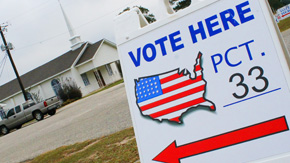Voting Rights Changes Would Not Impact Florida
January 24, 2014
A proposed overhaul of the Voting Rights Act that would essentially revive the process of “preclearance” would leave Florida out of the list of states that would have to get federal approval for changes to elections procedures, a scenario that concerns some voting-rights advocates.
Voting-rights groups, many of which have been involved in recent legal battles over elections issues in Florida, largely support the bill, introduced by a bipartisan group of U.S. House and Senate members. But they note that the process in the bill for selecting which states are required to gain preclearance would not include Florida or several other jurisdictions that were included under an old formula.
 In June, the U.S. Supreme Court struck down as antiquated the formula Congress established in the 2006 version of the law to single out so-called “covered jurisdictions.” That formula, based on data from the 1960s and 1970s, was used to decide which parts of the country must submit almost any changes in voting laws or practices to the federal government for approval — the process known as preclearance.
In June, the U.S. Supreme Court struck down as antiquated the formula Congress established in the 2006 version of the law to single out so-called “covered jurisdictions.” That formula, based on data from the 1960s and 1970s, was used to decide which parts of the country must submit almost any changes in voting laws or practices to the federal government for approval — the process known as preclearance.
Before the ruling, five Florida counties were among the “covered jurisdictions,” which in effect required the state to submit any rules or new laws affecting those areas. That allowed the U.S. Department of Justice or a three-judge federal panel to review essentially any statewide voting law as well.
Florida officials, who had challenged the preclearance section of the Voting Rights Act in a separate case, applauded the decision.
“Any time we have the opportunity to make our own decisions, I think that’s great for our state,” Gov. Rick Scott said at the time.
Under the new proposal, any state where governments were found to have violated the Voting Rights Act five times in a 15-year period would be subject to preclearance. While at least one of the violations would have to be committed by the state itself, others could be committed by local governments.
There would also be separate procedures for requiring that cities or counties be subject to preclearance.
“This bill modernizes the Voting Rights Act and will restore those protections that were gutted by the court, and will ensure that every citizen has an equal opportunity to participate in our democracy,” said House Judiciary Chairman Jim Sensenbrenner, R-Wis., at an event unveiling the change.
According to supporters of the legislation, it would sweep up four states: Georgia, Louisiana, Mississippi and Texas. Under the old Voting Rights Act, Virginia, Arizona, Alaska and parts of California, Michigan, New York, North Carolina and South Dakota were covered, along with Florida’s five counties.
That disappointed some groups involved in battles with the state of Florida over the last several years on everything from a massive rewriting of the state’s elections laws to efforts to remove the names of suspected non-citizens from the voting rolls.
“We’re very concerned on behalf of the voters of Florida and the groups we work with on the ground there,” said Katherine Culliton-González, director of voter protection for Advancement Project, a Washington, D.C.-based group involved in some of the legal fights in Florida.
One shortcoming of the preclearance formula, Culliton-González said, is that only a judge’s ruling or a denial of preclearance for a covered jurisdiction counts as a violation. If legal settlements or consent decrees were also included in the definition, she said, Florida would be eligible for coverage.
The new standard could actually encourage voting-rights groups and others to continue legal fights in hopes of getting a court order that would count toward preclearance, she said.
But advocates also note that the state would still be eligible for preclearance if there are problems in the future.
“We have concerns that Florida is not on the initial list, but because the proposal contains a rolling trigger, it will enable Florida … should it be necessary, to be on the protected list” again, said Deirdre Macnab, president of the League of Women Voters of Florida.
Other provisions of the bill, including one requiring 180 days’ notice for changes that would affect federal elections and another making it easier to get voting changes blocked, would be implemented nationwide.
by Brandon Larrabee, The News Service of Florida



Comments